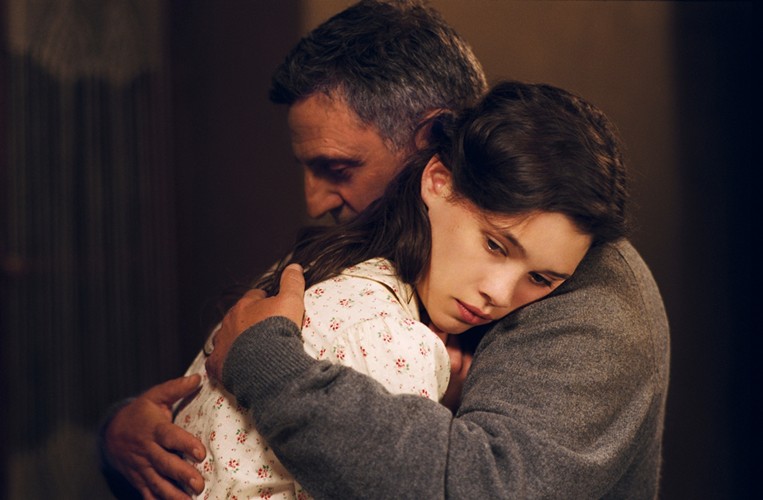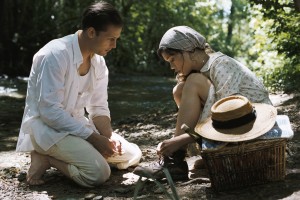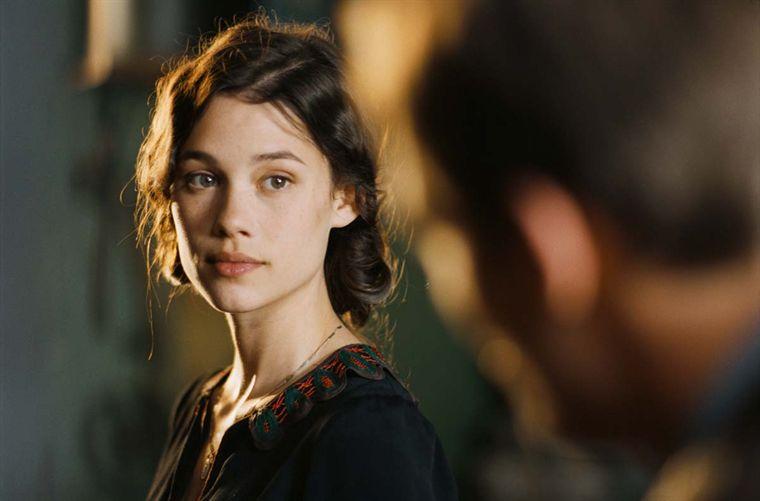It’s got Daniel Auteuil striding moodily (yet approachably) through the Provençal countryside so it must be Pagnol, right? Up to a point. He is best known to us as the author of Jean de Florette and Manon des sources. On paper, this is vintage Marcel Pagnol – a remake of the writer-film-maker’s 1940 film La fille du puisatier, faithful down to large chunks of dialogue – but on screen this is a rather different creature, and it’s clear that there’s a new eye behind the lens. That eye belongs to none other than Auteuil himself. At a distance of some 50 years, the actor has chosen to make his directorial debut with the very material where it all started for him.
It’s evident from this affectionate, poised feature that Auteuil is at home in Pagnol’s world, which is – after all – his own as well. The native southerner slips his Provençal twang back on as Pascal Amoretti – well-digger, widower and father to six daughters. The eldest, a dangerous 18 years old, is fresh from a Parisian convent and “as kind as she is pretty”. When Patricia (Astrid Bergès-Frisbey) allows an impassive young man to carry her across a river (having never, apparently, read Tess of the D’Urbervilles) her virtue takes a bit of a tumble. Against the distant rhythms of the Second World War we watch as Pascal and his family adjust to this unexpected turn of events, playing out a familiar drama of paternal duty and filial devotion.
Auteuil seasons the film’s sentiment with truthful humour
The rather un-Pagnol look of the film is largely down to the cinematography of Jean-François Robin, who gilds every cornfield (and there are plenty), paints a hazy glow on flowers and the perfect features of Bergès-Frisbey, and can’t even resist bringing a soft-focus charm to the brusque interior of the well-digger’s cottage. It’s all rather beautiful, and a harmonious vehicle for Pagnol’s simple story. The war is kept determinedly off screen, its function limited to justifying a rather natty uniform for Patricia’s pilot-lover Jacques (Nicolas Duvauchelle). So while this is a World War Two romance, it’s not quite the kind you might expect.
 It’s fair to say that expectations are deliberately thwarted on several counts. While the original offered a crisper, sharper take on its pastoral ruminations, Auteuil (pictured right with Bergès-Frisbey) has none of Pagnol’s detachment. We revel – as he does – in an endless summer, and even a tale clearly ordained for tragedy can’t quite bring itself to follow through. Instead it confines itself (perhaps more interestingly) to unpicking the nuances of family relationships. Pascal ponders his girls – “Until they are married you don’t know their name” – and the relationship between family and identity.
It’s fair to say that expectations are deliberately thwarted on several counts. While the original offered a crisper, sharper take on its pastoral ruminations, Auteuil (pictured right with Bergès-Frisbey) has none of Pagnol’s detachment. We revel – as he does – in an endless summer, and even a tale clearly ordained for tragedy can’t quite bring itself to follow through. Instead it confines itself (perhaps more interestingly) to unpicking the nuances of family relationships. Pascal ponders his girls – “Until they are married you don’t know their name” – and the relationship between family and identity.
 Leading the cast, Auteuil seasons the film’s sentiment with truthful humour, trading acerbic quips with colleague and friend Felipe (an immensely touching Kad Merad). It’s not a complex performance, more Conversations With My Gardener than Hidden, but set against the tentative sweetness of Bergès-Frisbey and soft-pedalled support from Jean-Pierre Darroussin as Jacques’s father, it slips down nicely enough. Only Duvauchelle (pictured left - long on cheekbones and profile shots, short on dialogue) struggles, cursed by a rather unconvincing moral transformation. There’s little in his strong silences and pawings to redeem him, and you just know that he’ll be off with the first Parisian mademoiselle that gives him the eye.
Leading the cast, Auteuil seasons the film’s sentiment with truthful humour, trading acerbic quips with colleague and friend Felipe (an immensely touching Kad Merad). It’s not a complex performance, more Conversations With My Gardener than Hidden, but set against the tentative sweetness of Bergès-Frisbey and soft-pedalled support from Jean-Pierre Darroussin as Jacques’s father, it slips down nicely enough. Only Duvauchelle (pictured left - long on cheekbones and profile shots, short on dialogue) struggles, cursed by a rather unconvincing moral transformation. There’s little in his strong silences and pawings to redeem him, and you just know that he’ll be off with the first Parisian mademoiselle that gives him the eye.
With remakes (of the non-Hollywood variety at least) there’s always the question of why this film, why now? Is The Well-Digger’s Daughter relevant? Not in any way I understand the term. And it’s all the better for it. How many of us wouldn’t trade a summer for a day in Pagnol’s honey-dipped world? Here we get the chance to revisit it – a little sweeter, a little more cloying than we might remember, but a blissfully uncomplicated pleasure nonetheless. Auteuil has plans to continue his new directorial role, reworking Pagnol’s early trilogy of Marius, Fanny and Cesar. Once the haze of nostalgia has cleared, these should show what Auteuil the director is really made of.















Add comment